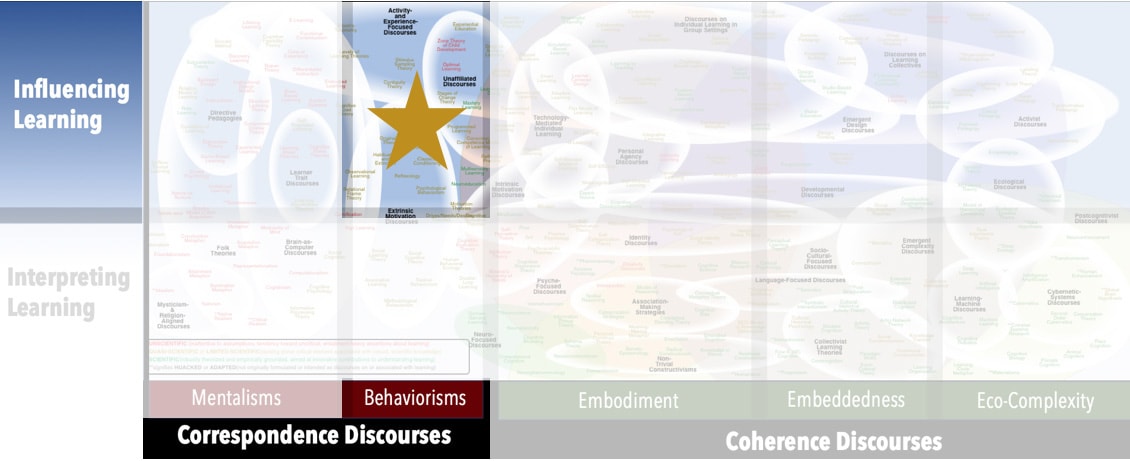Focus
Unexplained changes in stimulus–response pairingsPrincipal Metaphors
- Knowledge is … repertoire of behaviors
- Knowing is … behaving (triggered by stimuli)
- Learner is … an organism-in-context
- Learning is … changes in behavior (linking stimuli to responses)
- Teaching is … training; engineering behavior (through deliberate conditioning)
Originated
1960sSynopsis
Nonassociative Learning occurs when an organism’s responses to a stimulus change, with no apparent influence from learning events. Nonassociative Learning processes include:- Blocking (Leon Kamin, 1960s) – the failure to learn (respond to) a new stimulus when there is a trained stimulus present – i.e., the earlier-encountered stimulus “blocks” the ability to learn about later-introduced stimulus
- Dishabituation (Dehabituation) – a recovery or restoration of a behavior that had become habituated (e.g., noticing a background noise that one had grown used to)
- Extinction – reduction in a learned behavior
- Habituation – a reduction in innate behavior (e.g., no longer startled by a loud noise)
- Imprinting – a rapid type of learning, typically limited to a very tight window after birth, that involves an initial fixing of attention on an object or agent and a subsequent tendency to follow that object or agent. Imprinting has been observed in many birds, some fishes and insects, and a few mammals. Whether humans imprint is a disputed matter.
- Inhibition/Disinhibition – increase/decrease in the intensity of a learned behavior, owing to processes not associated with the learning (e.g., observing consequences of others’ actions; recalling prohibitions from youth)
- Instinctual Drift (Instinctive Drift) (Keller Breland, Marian Breland, 1960s) – the tendency of learned behaviors to revert to innate, instinctual patterns over time
- Satiation – the reduction or loss of a reinforcer’s effectiveness, due to repeated use
- Sensitization – an increase in responsiveness to a specific stimulus
- Spontaneous Recovery (Ivan Pavlov, 1920s) – the re-appearance of a thought-to-be-extinguished behavior. Although originally formulated to refer to the recovery of “lost” conditioned responses, the notion has since been extended to memories of all sorts.
Authors and/or Prominent Influences
See Behaviorisms.Status as a Theory of Learning
See Behaviorisms.Status as a Theory of Teaching
See Behaviorisms.Status as a Scientific Theory
See Behaviorisms.Subdiscourses:
- Blocking
- Dishabituation (Dehabituation)
- Extinction
- Habituation
- Imprinting
- Inhibition/Disinhibition
- Instinctual Drift (Instinctive Drift)
- Satiation
- Sensitization
- Spontaneous Recovery
Map Location

Please cite this article as:
Davis, B., & Francis, K. (2024). “Nonassociative Learning” in Discourses on Learning in Education. https://learningdiscourses.com.
⇦ Back to Map
⇦ Back to List
